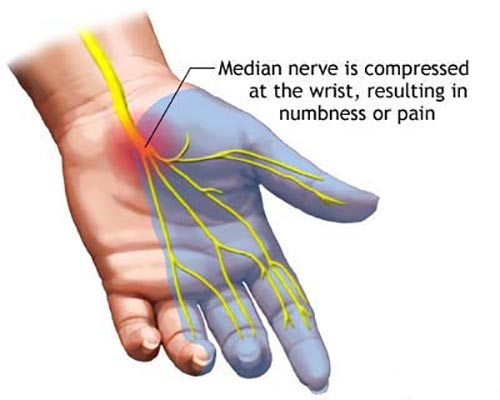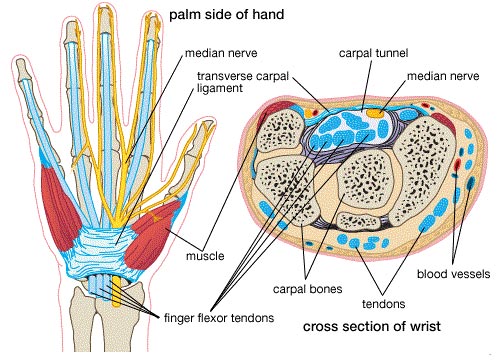Carpal tunnel syndrome (CTS), a relatively common condition that causes a tingling sensation, numbness and sometimes pain in the hand and fingers. Usually, symptoms develop gradually and start off being worse during the night or early in the morning. They tend to affect the thumb, index, middle and half of the ring fingers (Figure 1).
Symptoms of CTS are often worse after using the affected hand. Any repetitive actions of the hand or wrist can aggravate the symptoms, as can keeping your arm or hand in the same position for a prolonged period of time, especially whilst sleeping. People with CTS often complain of impaired dexterity, which is the ability to use your hands effectively to carry out certain tasks, e.g. you may drop objects and/or specific tasks.
What causes CTS?
In CTS is caused by compression of the median nerve in the carpal tunnel, which is a narrow passage in your wrist made up of small bones and the transverse carpal ligament (Figure 2). The exact cause of compression is not always known, although certain things are thought to increase the risk of CTS developing:
• family history of CTS.
• pregnancy – up to about 50% of pregnant women develop CTS.
• injuries to the wrist.
• other health conditions, such as diabetes and rheumatoid arthritis.
• strenuous, repetitive work with the hand.
Diagnosing CTS
CTS can usually be diagnosed by an experience clinician. CTS physical tests i.e. Phalens or Tinels test are routinely used, but are not always reliable. A nerve conduction test is commonly used to test the severity of the compression on the median nerve. Further tests is usually only required if your clinician is uncertain and/or requires to rule in/out other conditions. Other tests may include electromyography, ultrasound, xray and blood tests.
Treating CTS
In some cases CTS will disappear without treatment within a few months by restricting the activities that make your symptoms worse or treating the underlying. Non-surgical treatments, such as wrist splints and corticosteroid injections, are used to treat mild or moderate symptoms. Carpal tunnel release/decompression surgery is usually recommended for cases of recalcitrant CTS.

Figure 1. Carpal Tunnel Symptoms

Figure 2. Carpal Tunnel Anatomy


